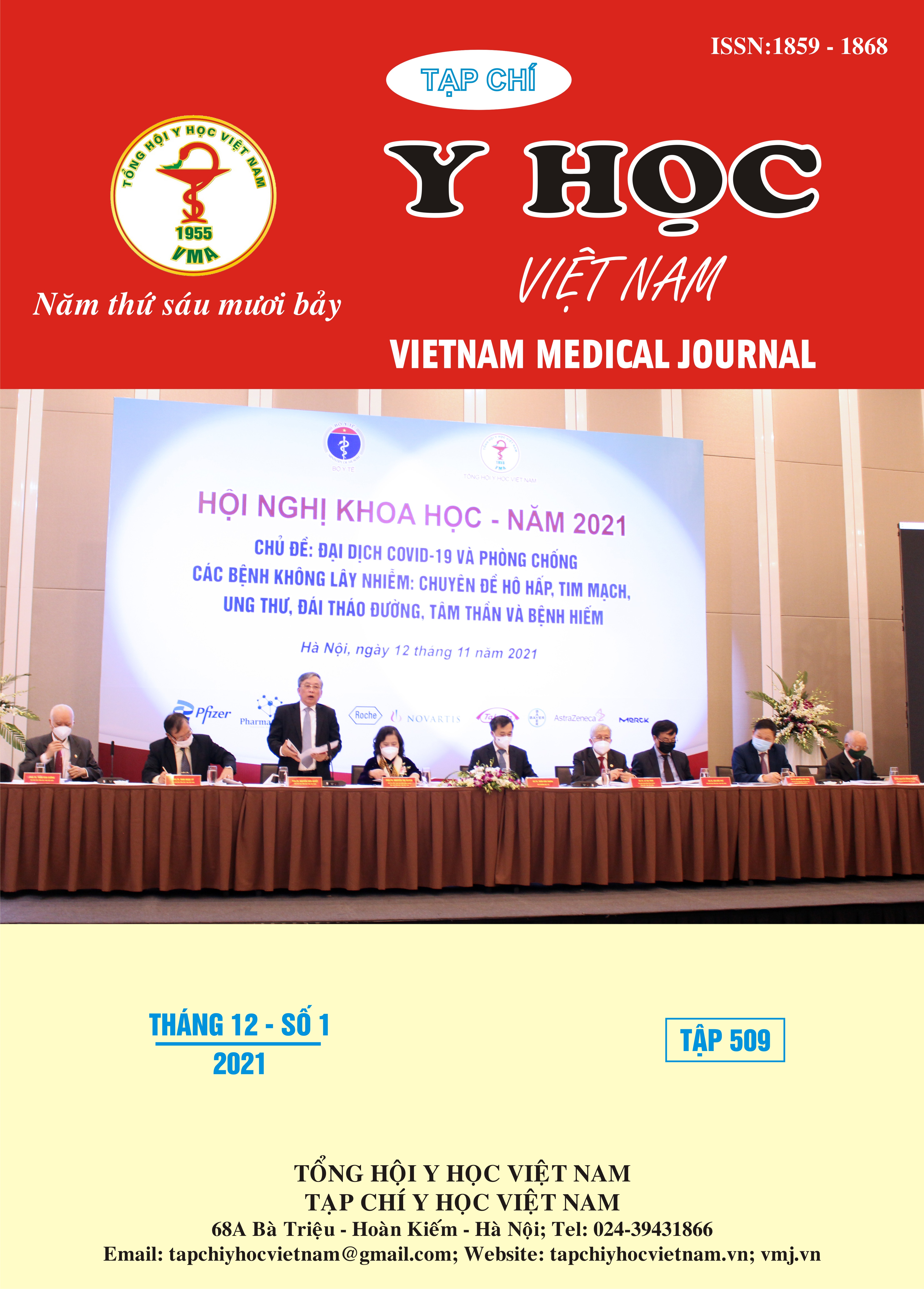RESULTS OF SURGERY IN STAGE III, IV (M0) TONGUE CANCER POST NEOADJUVANT CHEMOTHERAPY
Main Article Content
Abstract
Objectives: This study was conducted to report clinicals, subclinicals and evaluate the results of surgery in stage III,IV(M0) tonge cancer post neoadjuvant chemotherapy at Vietnam National Cancer Hospital. Patients and methods: A retrospective, descriptive study on 63 patients with neoadjuvant chemotherapy tongue cancer patients were operated in K hospital from 01/2014 to 12/2020. Results: Mean age 51.3; male/female: 3.6/1; the most common position of tumor is the edge of tongue 87.3%; 53.9% tumor over 4cm, 79.4% lymph node less than 3cm, chemotherapy regimens TCF 9.5% TC 57.1% CF 33.4%; Complete response 11.1% , partial reponse 62.4%, stable disease 26.3%. The main surgical method is hemiglossectomy and neck lymph node dissection 61.9%, the surgical complications is rare, the most common complications are flap necrosis and salivary leakage 4.8%. 5 years overall survival was 24.1%, of stage III group was 48.1%, stage IV group was 8.1%. Conclusion: Tongue cancer is common in middle-aged men, the disease is often detected at an advanced stage. Surgery is the main treatment. Neo-adjuvant chemotherapy helps shrink tumors and lymph nodes, facilitating surgery. The choice of chemotherapy regimen, surgical methods of tumor removal and reconstruction depends on the patient's performance status and the experience of the physician. The survival time of the stage III group was higher than that of the stage IV(M0) group.
Article Details
Keywords
tongue cancer, neoadjuvant, , tongue surgery
References
2. Rivera C. Essentials of oral cancer(2015). Int J Clin Exp Pathol. 8(9):11884-11894.
3. Listl S, Jansen L, Stenzinger A, et al(2013). Survival of patients with oral cavity cancer in Germany. PLoS One. 8(1):e53415.
4. Pergolizzi S, Santacaterina A, Adamo B, et al(2011). Induction chemotherapy with paclitaxel and cisplatin to concurrent radiotherapy and weekly paclitaxel in the treatment of loco-regionally advanced, stage IV (M0), head and neck squamous cell carcinoma. Mature results of a prospective study. Radiation Oncology.6(1):162.
5. Ngô Xuân Quý (2020). Nghiên cứu kết quả hóa trị bổ trợ trước phác đồ TC và tỷ lệ bộc lộ một số dấu ấn liên quan đến ung thư lưỡi giai đoạn III-IV(M0).
6. Zhong LC, Lu F, Ma F, et al(2015). Ultrasound-guided fine-needle aspiration of thyroid nodules: does the size limit its efficiency? Int J Clin Exp Pathol.8(3):3155-3159.
7. Vokes EE, Stenson K, Rosen FR, et al(2003). Weekly carboplatin and paclitaxel followed by concomitant paclitaxel, fluorouracil, and hydroxyurea chemoradiotherapy: curative and organ-preserving therapy for advanced head and neck cancer. J Clin Oncol.
8. Zhong L ping, Zhang C ping, Ren G xin, et al(2013). Randomized Phase III Trial of Induction Chemotherapy With Docetaxel, Cisplatin, and Fluorouracil Followed by Surgery Versus Up-Front Surgery in Locally Advanced Resectable Oral Squamous Cell Carcinoma.
9. Schwam ZG, Sosa JA, Roman S, Judson BL(2015). Complications and mortality following surgery for oral cavity cancer: analysis of 408 cases. Laryngoscope. 125(8):1869-
10. Lê Văn Quảng (2013). Nghiên cứu điều trị ung thư lưỡi giai đoạn III,IV(M0) bằng cisplatin-5FU bổ trợ trước phẫu thuật và/hoặc xạ trị. Luận án Tiến sĩ Y học. Trường Đại học Y Hà Nội


